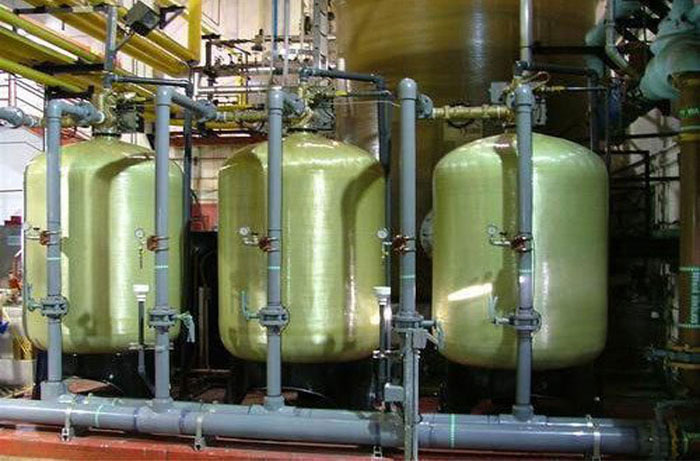Demineralization Plant
 Demineralization Plant
Types of demineralization systems
Demineralization Plant
Types of demineralization systemsDemineralization is the removal of salts dissolved in water by ion exchange. The units are used for many applications, including the production of flushing water, process water, boiler water, etc. In short, demineralization is concerned with the treatment process intended to remove all dissolved salts. The demineralization of water can be obtained mainly by three techniques:
- By passage through ion exchange resins (cationic and anionic), This process is limited to relatively low salinity water, up to approximately 2g per litre, and has the disadvantage of using corrosive chemicals: acid and soda, on the other hand, it can produce very pure water.
- By reverse osmosis, a process applicable to large varieties of salinity (up to seawater), and in a very wide range of flow rates, from a few litres / h to several hundred m 3 / h
- By distillation, reserved either for laboratory applications or industrial from seawater in vacuum boilers-evaporators in cascades.
Ion exchange resin plants
- Ion exchange resin plants basically consist of a cationic resin processing section and an anionic resin processing section.
- These resins contain active functional groups immobilized on a matrix that can exchange mobile ions with the same charged ions present in the solution to which they come into contact. Cationic resins remove cations, and anionic resins remove anions.
- Through mixed bed resins (mixtures of cationic and anionic resins), the manufacturer of Demineralization Plant in Pune provides ultrapure demineralized water systems with a conductivity of less than 0.1 μS / cm.
Improves the quality of the water produced (compared to a single reverse osmosis device) Less water consumption (the inlet water is totally demineralized, without waste) There is only the water consumption for the regeneration phases, even if it is lower than the waste/concentrate osmosis) Less energy consumption
CONS:
- Consumption of acidic and sodium reagents for regeneration and related problems of sulphates or chlorides.
- Longer installation time
- Need for a double cationic/anionic line for continuity of operation
Reverse osmosis installations take advantage of the principle of physical permeability of a membrane to obtain the demineralization of water.
This process is not only a physical obstacle (determined by the size of the pores of the membrane) to the passage of molecules but exploits the different chemical affinities of the species with the membrane, allowing the passage of hydrophilic (or type water) chemically similar to water. For ultra-pure water production by reverse osmosis, the manufacturer of Demineralization Plant in Mumbai uses two-stage reverse osmosis systems combined with continuous electro deionization units (CEDI).
PRO:
- There is no production of regeneration eluates (they are eluted only during the osmotic membrane washing cycle, which is intermittent).
- Quick and easy installation
- No acid and soda are used for regeneration (anti-seize products can be dosed at the inlet; it depends on the quality of the water at the inlet).
- Production of water of lower quality than resins (if you consider a once-through system)
- More energy consumption
- Higher water consumption (waste concentrates continuously during the production phase, around 30% of the input)




